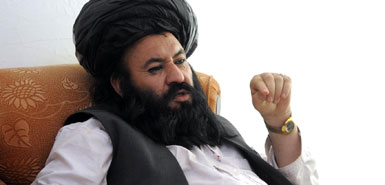 The Governor of Musa Qala, Mullah Abdul Salaam, gave warning yesterday that infiltrators from Pakistan and Iran were deliberately attempting to escalate the conflict in Afghanistan.
The Governor of Musa Qala, Mullah Abdul Salaam, gave warning yesterday that infiltrators from Pakistan and Iran were deliberately attempting to escalate the conflict in Afghanistan. The Governor, who was formerly a Taleban commander, said that the insurgency attacks against coalition forces, which have accounted for the worst coalition casualty figures in a single month since the war began, were now principally the work of outsiders rather than the Taleban. "They come from Pakistan, they come from Iran," Mullah Salaam said in an interview with The Times and two other newspapers. "They are doing their action in Afghanistan against their enemy."
He claimed that it was Pakistanis and Iranians who were responsible for planting improvised explosive devices, the crude but deadly homemade bombs, of which intelligence sources estimate there are 500 in the Musa Qala district alone. "It is like a sickness that everybody is doing suicide bombs. There is nothing like suicide bombs in our religion. It is nothing to do with our religion."
The Governor, who spoke in the office of his compound in the heavily protected District Centre of Musa Qala, insisted that the war against the Taleban and its allies was being waged in the name of democracy. "Yes, people are ready for democracy," he said, "but a democracy which is a little bit different from foreign democracy. We have our own Islamic rules and society. Our country has changed, our religion has changed, but they are doing their democracy in their own way."
The Governor inevitably attracts suspicion from some of his new allies on account of his past allegiances, which led him to fight against British troops. Asked how safe he felt personally, he said:
| "The best security in Afghanistan is in Helmand province in Musa Qala." |
Since Musa Qala is under constant threat from the Taleban insurgency, it seemed a bold claim to make, but the Governor was insistent that security was well guaranteed by coalition forces acting alongside the Afghan National Army. "I think there is unity," he said. "I don't think there is any problem for us with unity."
As for his relationship with President Karzai, which has occasionally come under strain, he said: "It is a good relationship with our President. We have good relations because he is our Islamic Republic of Afghanistan and I don't have any problem [with that]. If I had any problems with him I don't think I would be Governor any more."
Mullah Salaam said that relations with the British troops stationed at Musa Qala were good, on the whole, but added: "Sometimes we have a little bit of problems with the new groups coming in who are not used to Afghans. But we have a good relationship."
Asked to explain how he became a Taleban supporter in the first place, he said: "I joined the Mullah Omar group because there was a lot of activities in Afghanistan, and it was a new group in the name of Islam. Because they were Muslim people, I joined them, and I thought they would be good people, they would make our Afghanistan better and better. But there was a lot of groups which destroyed our country in the end."
As for his personal ambitions, he concluded: "I will do my best for my people. I will do my very best for the people of Afghanistan. It was not my ambition to be the Governor but I am serving for my people and am delighted to be taking on this job."

 BRITISH troops stormed into Musa Qala yesterday as Taleban fighters fled their fortress town.
BRITISH troops stormed into Musa Qala yesterday as Taleban fighters fled their fortress town.  An Afghan tribal leader is in talks to defect from the Taliban and take thousands of armed tribesmen with him to fight alongside British forces in southern Afghanistan. The Daily Telegraph has learned that the Afghan government hopes to seal the deal this week with
An Afghan tribal leader is in talks to defect from the Taliban and take thousands of armed tribesmen with him to fight alongside British forces in southern Afghanistan. The Daily Telegraph has learned that the Afghan government hopes to seal the deal this week with  Final results of Afghanistanâs legislative elections show several former commanders of military factions, three old Taliban officials, women activists and several ex-communists won seats in the new parliament. The results of the September 18 vote for the 249-seat lower house, or Wolesi Jirga, and councils in all 34 provinces were finally released on Saturday, after being delayed by a slow count and accusations of vote fraud. Bissmillah Bissmil, chairman of the United Nations-Afghan Joint Electoral Management Body, described the polls as a milestone in the countryâs transition to democracy. The UN-organised elections were held on a non-party basis, with all 5,800 candidates running as independents, raising fears that a fragmented parliament will emerge, with members focused on parochial issues as they compete for government resources.
Final results of Afghanistanâs legislative elections show several former commanders of military factions, three old Taliban officials, women activists and several ex-communists won seats in the new parliament. The results of the September 18 vote for the 249-seat lower house, or Wolesi Jirga, and councils in all 34 provinces were finally released on Saturday, after being delayed by a slow count and accusations of vote fraud. Bissmillah Bissmil, chairman of the United Nations-Afghan Joint Electoral Management Body, described the polls as a milestone in the countryâs transition to democracy. The UN-organised elections were held on a non-party basis, with all 5,800 candidates running as independents, raising fears that a fragmented parliament will emerge, with members focused on parochial issues as they compete for government resources.